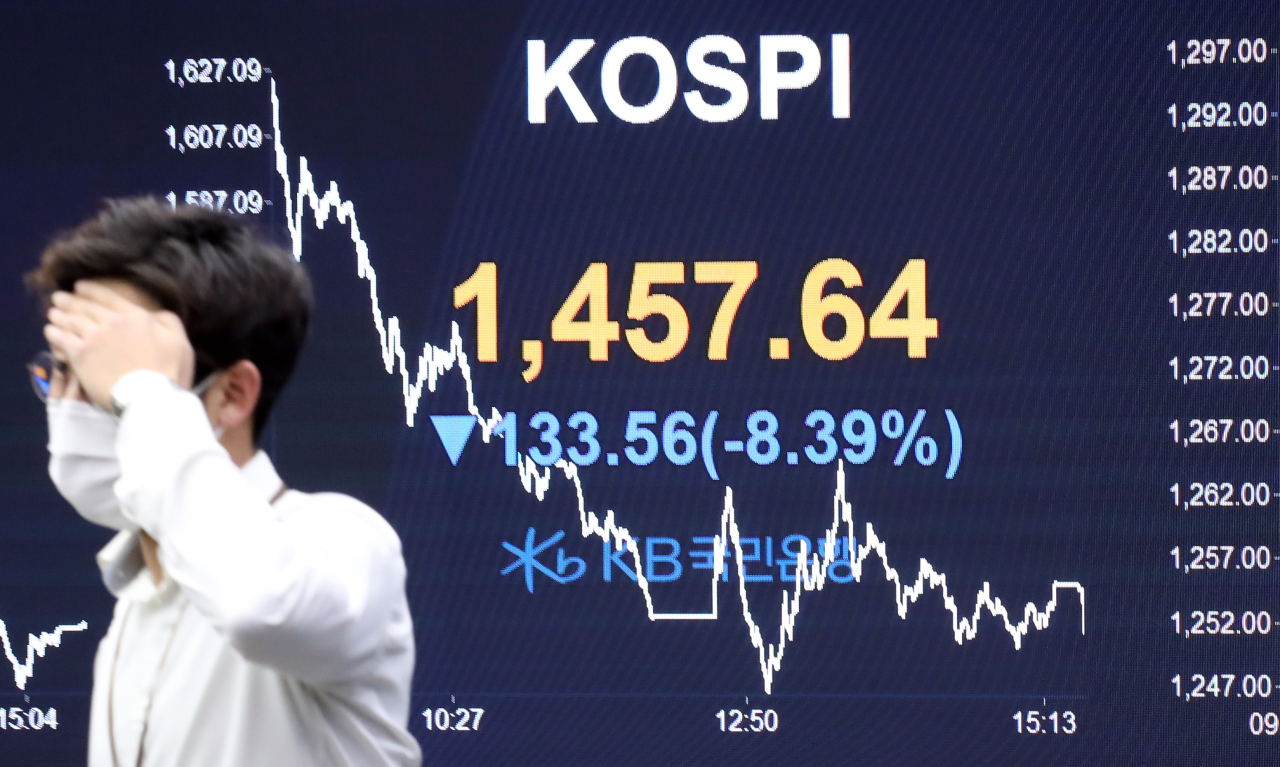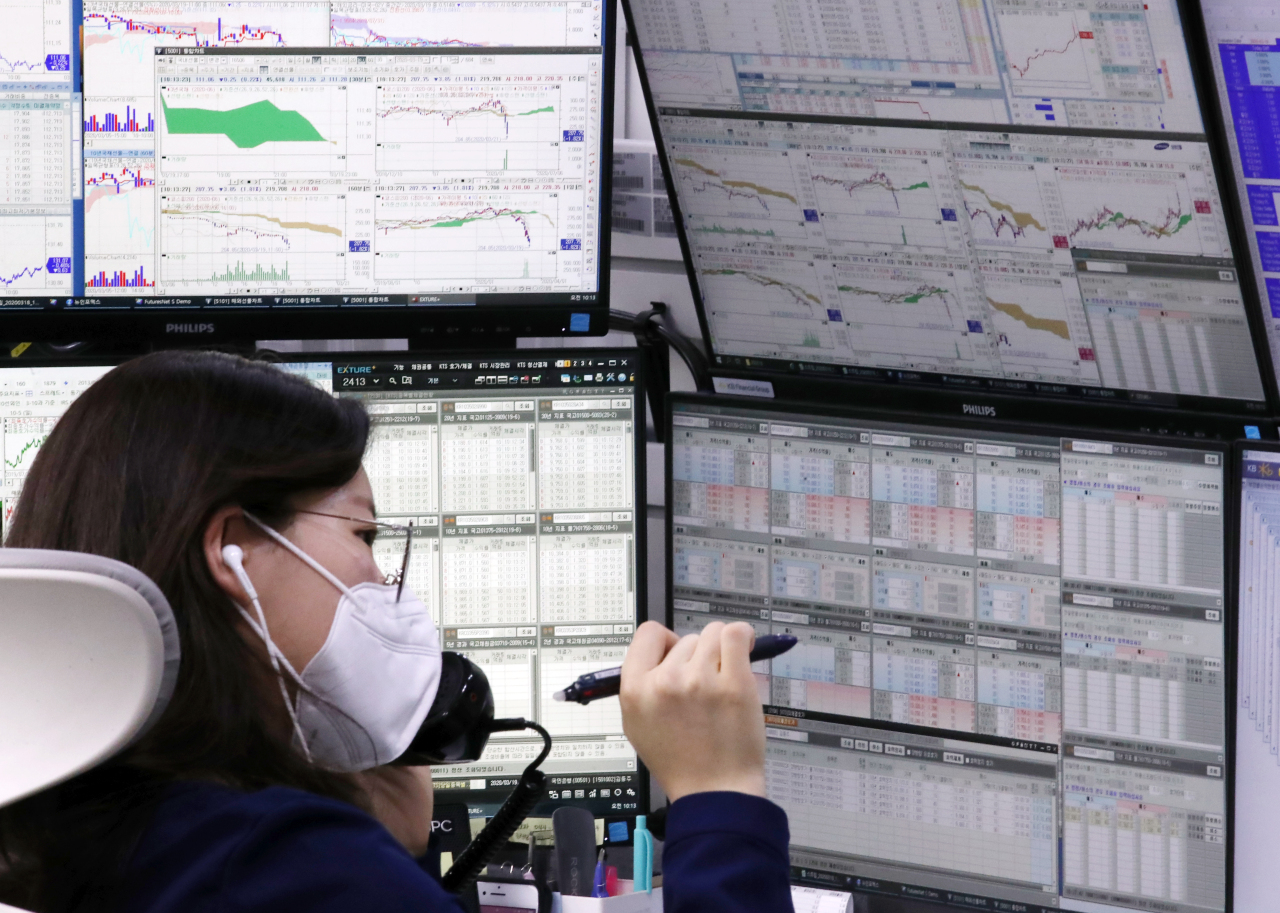
South Korean stocks crumbled again Thursday, hitting the lowest point in nearly 11 years, as foreigners’ selling spree continued over growing global uncertainties.
The benchmark Kospi closed at 1,457.64 -- down 133.56 points, or 8.39 percent, from the previous session. It marked the lowest closing price since July 23, 2009, at 1,496.49 points. The tech-heavy Kosdaq also crashed by 56.79 points, or 11.71 percent, to close at 428.35. It recorded the lowest closing since Oct. 5, 2011, with 421.18 points.
Stock market operator Korea Exchange (KRX) temporarily suspended stock trading as the country’s two main exchanges dipped sharply. It marked the second time recently for trading on both markets to be suspended on the same day, following March 13.
A “sidecar,” the five-minute trading halt was issued on the main bourse at 11:50 a.m. due to a sudden market fluctuation. It was followed by another trading halt with a circuit breaker on both the Kospi and Kosdaq markets at 12:05 p.m., as they sank by over 8 percent for more than a minute. KRX again activated the sidecar to suspend trading on the Kosdaq at 12:54 p.m.
The local currency closed at 1,285.7 won against the greenback -- weakening 40 won from the previous session’s close -- the worst rate since July 14, 2009, at 1,293 won per dollar.
As of 12:26 p.m., the market capitalization of listed firms on the Kospi marked 984.7 trillion won ($765.8 billion) -- losing some 87.3 trillion won from the previous session’s close. It was the first time for the main bourse’ market valuation had dipped below 1,000 trillion won at the closing bell since Oct. 7, 2011 (996.7 trillion won).
In response to the COVID-19 pandemic, foreign investors continued to dump their shares in Korea and other emerging markets, as they attempt to rebalance their asset portfolios.

Offshore investors offloaded a net 616.6 billion won of their shares in Kospi market alone on Thursday, posting a net-selling for the eleventh consecutive trading session dating to March 5. According to a report from Yuanta Securities Korea, foreign investors sold a net $5.8 billion worth of local stocks in the first two weeks of March.
They dumped a net $6.7 billion of Taiwanese shares during the given period, followed by Indian stocks and Brazilian shares worth $3.8 billion and $3.2 billion, respectively. India was the only emerging economy with foreign net-buying last month, but it turned to net-selling this month. Foreigners also sold $1.3 billion worth of Thai stocks and $213 million in Indonesia stocks.
Korea and Taiwan, which are heavily dependent on exports among the emerging markets, were hit hardest by the novel coronavirus scare. The Kospi and Kosdaq indexes fell 28.6 percent and 27.6 percent from the beginning of the year to Wednesday, while the Taiwan Capitalization Weighted Stock Index dipped 23.2 percent, according to the local brokerage.
Among the listed stock items in the local stock market, foreign investors sold market bellwether Samsung Electronics’ shares the most, while retail investors scooped the stocks up the most. Foreigners sold 2.71 million market bellwether shares on Thursday alone.
The share price of Samsung Electronics, which hit 62,800 won on Jan. 20, decreased by 20.56 percent as of Wednesday’s market close. It once fell to 42,300 won per share, then inched up to close at 42,950 won per share on Thursday, marking its lowest close since Aug. 8.
The massive amount of cash exiting emerging economies was triggered by rising uncertainties with the global spread of COVID-19. The Dow Jones Industrial Average on Wednesday crashed 6.3 percent to close at 19,898.92, the lowest closing price since February 2017. The S&P and Nasdaq also surrendered 5.18 percent and 4.7 percent, respectively, on the same day.
Market experts said foreigners will continue to sell off their shares in emerging markets, since stimulus packages released around the globe have yet to put an end to the virus panic.
“The wide-spreading COVID-19 and worry over the global economy recession attributed to foreigners’ continuous selling spree. Not just in Korea market, but funds have been evaded from capital market around the globe,” said Lee Kyung-min, an analyst at Daishin Securities.
“There’s a possibility that foreigners’ massive dumping in the Korea stock market will continue for a while, even after the virus outbreak gets eased. They’ve preferred to ensure dollars over growing uncertainty,” said a market watcher from a global investment bank, who wished to remain anonymous.
“Foreigners will turn to net buyers once they see Korean firms’ business performance get stabilized.”
By Jie Ye-eun (yeeun@heraldcorp.com)






![[From the Scene] Monks, Buddhists hail return of remains of Buddhas](http://res.heraldm.com/phpwas/restmb_idxmake.php?idx=644&simg=/content/image/2024/04/19/20240419050617_0.jpg&u=20240419175937)





![[Graphic News] French bulldog most popular breed in US, Maltese most popular in Korea](http://res.heraldm.com/phpwas/restmb_idxmake.php?idx=644&simg=/content/image/2024/04/18/20240418050864_0.gif&u=)



![[From the Scene] Monks, Buddhists hail return of remains of Buddhas](http://res.heraldm.com/phpwas/restmb_idxmake.php?idx=652&simg=/content/image/2024/04/19/20240419050617_0.jpg&u=20240419175937)

![[KH Explains] Hyundai's full hybrid edge to pay off amid slow transition to pure EVs](http://res.heraldm.com/phpwas/restmb_idxmake.php?idx=652&simg=/content/image/2024/04/18/20240418050645_0.jpg&u=20240419100350)

![[Today’s K-pop] Illit drops debut single remix](http://res.heraldm.com/phpwas/restmb_idxmake.php?idx=642&simg=/content/image/2024/04/19/20240419050612_0.jpg&u=)